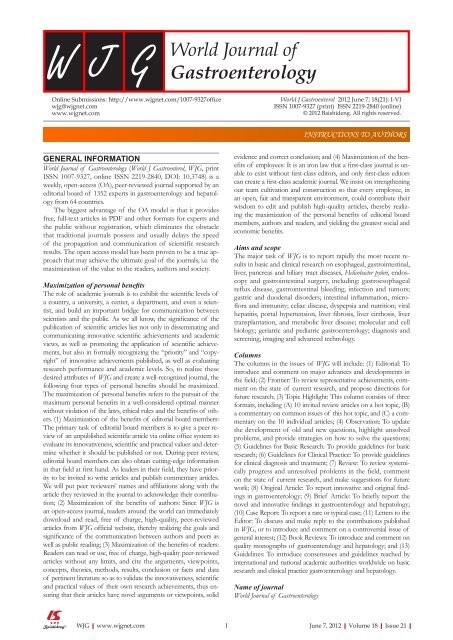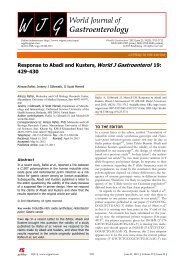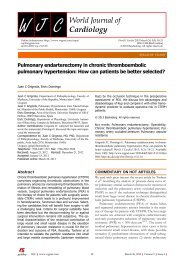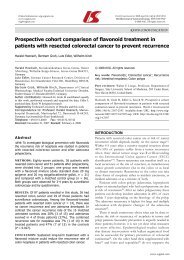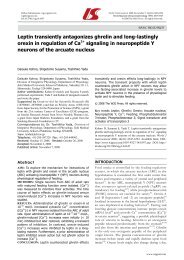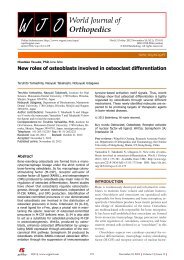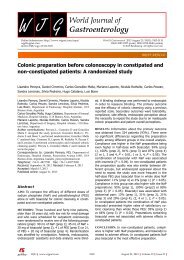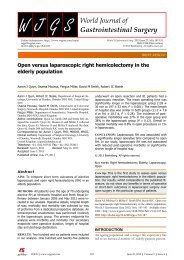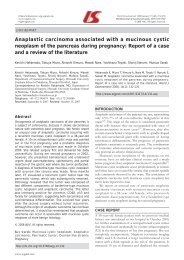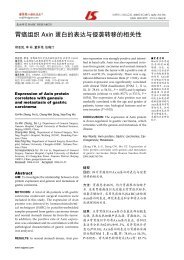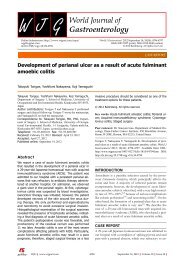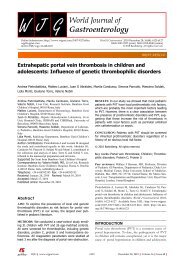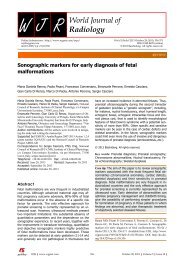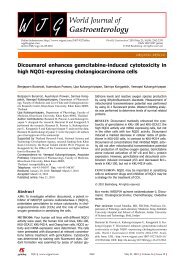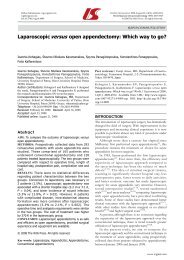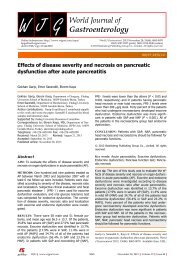Evidence base and patients' perspective - World Journal of ...
Evidence base and patients' perspective - World Journal of ...
Evidence base and patients' perspective - World Journal of ...
You also want an ePaper? Increase the reach of your titles
YUMPU automatically turns print PDFs into web optimized ePapers that Google loves.
Online Submissions: http://www.wjgnet.com/1007-9327<strong>of</strong>fice<br />
wjg@wjgnet.com<br />
www.wjgnet.com<br />
GENERAL INFORMATION<br />
<strong>World</strong> <strong>Journal</strong> <strong>of</strong> Gastroenterology (<strong>World</strong> J Gastroenterol, WJG, print<br />
ISSN 1007-9327, online ISSN 2219-2840, DOI: 10.3748) is a<br />
weekly, open-access (OA), peer-reviewed journal supported by an<br />
editorial board <strong>of</strong> 1352 experts in gastroenterology <strong>and</strong> hepatology<br />
from 64 countries.<br />
The biggest advantage <strong>of</strong> the OA model is that it provides<br />
free, full-text articles in PDF <strong>and</strong> other formats for experts <strong>and</strong><br />
the public without registration, which eliminates the obstacle<br />
that traditional journals possess <strong>and</strong> usually delays the speed<br />
<strong>of</strong> the propagation <strong>and</strong> communication <strong>of</strong> scientific research<br />
results. The open access model has been proven to be a true approach<br />
that may achieve the ultimate goal <strong>of</strong> the journals, i.e. the<br />
maximization <strong>of</strong> the value to the readers, authors <strong>and</strong> society.<br />
Maximization <strong>of</strong> personal benefits<br />
The role <strong>of</strong> academic journals is to exhibit the scientific levels <strong>of</strong><br />
a country, a university, a center, a department, <strong>and</strong> even a scientist,<br />
<strong>and</strong> build an important bridge for communication between<br />
scientists <strong>and</strong> the public. As we all know, the significance <strong>of</strong> the<br />
publication <strong>of</strong> scientific articles lies not only in disseminating <strong>and</strong><br />
communicating innovative scientific achievements <strong>and</strong> academic<br />
views, as well as promoting the application <strong>of</strong> scientific achievements,<br />
but also in formally recognizing the “priority” <strong>and</strong> “copyright”<br />
<strong>of</strong> innovative achievements published, as well as evaluating<br />
research performance <strong>and</strong> academic levels. So, to realize these<br />
desired attributes <strong>of</strong> WJG <strong>and</strong> create a well-recognized journal, the<br />
following four types <strong>of</strong> personal benefits should be maximized.<br />
The maximization <strong>of</strong> personal benefits refers to the pursuit <strong>of</strong> the<br />
maximum personal benefits in a well-considered optimal manner<br />
without violation <strong>of</strong> the laws, ethical rules <strong>and</strong> the benefits <strong>of</strong> others.<br />
(1) Maximization <strong>of</strong> the benefits <strong>of</strong> editorial board members:<br />
The primary task <strong>of</strong> editorial board members is to give a peer review<br />
<strong>of</strong> an unpublished scientific article via online <strong>of</strong>fice system to<br />
evaluate its innovativeness, scientific <strong>and</strong> practical values <strong>and</strong> determine<br />
whether it should be published or not. During peer review,<br />
editorial board members can also obtain cutting-edge information<br />
in that field at first h<strong>and</strong>. As leaders in their field, they have priority<br />
to be invited to write articles <strong>and</strong> publish commentary articles.<br />
We will put peer reviewers’ names <strong>and</strong> affiliations along with the<br />
article they reviewed in the journal to acknowledge their contribution;<br />
(2) Maximization <strong>of</strong> the benefits <strong>of</strong> authors: Since WJG is<br />
an open-access journal, readers around the world can immediately<br />
download <strong>and</strong> read, free <strong>of</strong> charge, high-quality, peer-reviewed<br />
articles from WJG <strong>of</strong>ficial website, thereby realizing the goals <strong>and</strong><br />
significance <strong>of</strong> the communication between authors <strong>and</strong> peers as<br />
well as public reading; (3) Maximization <strong>of</strong> the benefits <strong>of</strong> readers:<br />
Readers can read or use, free <strong>of</strong> charge, high-quality peer-reviewed<br />
articles without any limits, <strong>and</strong> cite the arguments, viewpoints,<br />
concepts, theories, methods, results, conclusion or facts <strong>and</strong> data<br />
<strong>of</strong> pertinent literature so as to validate the innovativeness, scientific<br />
<strong>and</strong> practical values <strong>of</strong> their own research achievements, thus ensuring<br />
that their articles have novel arguments or viewpoints, solid<br />
WJG|www.wjgnet.com<br />
<strong>World</strong> J Gastroenterol 2012 June 7; 18(21): I-VI<br />
ISSN 1007-9327 (print) ISSN 2219-2840 (online)<br />
© 2012 Baishideng. All rights reserved.<br />
evidence <strong>and</strong> correct conclusion; <strong>and</strong> (4) Maximization <strong>of</strong> the benefits<br />
<strong>of</strong> employees: It is an iron law that a first-class journal is unable<br />
to exist without first-class editors, <strong>and</strong> only first-class editors<br />
can create a first-class academic journal. We insist on strengthening<br />
our team cultivation <strong>and</strong> construction so that every employee, in<br />
an open, fair <strong>and</strong> transparent environment, could contribute their<br />
wisdom to edit <strong>and</strong> publish high-quality articles, thereby realizing<br />
the maximization <strong>of</strong> the personal benefits <strong>of</strong> editorial board<br />
members, authors <strong>and</strong> readers, <strong>and</strong> yielding the greatest social <strong>and</strong><br />
economic benefits.<br />
Aims <strong>and</strong> scope<br />
The major task <strong>of</strong> WJG is to report rapidly the most recent results<br />
in basic <strong>and</strong> clinical research on esophageal, gastrointestinal,<br />
liver, pancreas <strong>and</strong> biliary tract diseases, Helicobacter pylori, endoscopy<br />
<strong>and</strong> gastrointestinal surgery, including: gastroesophageal<br />
reflux disease, gastrointestinal bleeding, infection <strong>and</strong> tumors;<br />
gastric <strong>and</strong> duodenal disorders; intestinal inflammation, micr<strong>of</strong>lora<br />
<strong>and</strong> immunity; celiac disease, dyspepsia <strong>and</strong> nutrition; viral<br />
hepatitis, portal hypertension, liver fibrosis, liver cirrhosis, liver<br />
transplantation, <strong>and</strong> metabolic liver disease; molecular <strong>and</strong> cell<br />
biology; geriatric <strong>and</strong> pediatric gastroenterology; diagnosis <strong>and</strong><br />
screening, imaging <strong>and</strong> advanced technology.<br />
Columns<br />
The columns in the issues <strong>of</strong> WJG will include: (1) Editorial: To<br />
introduce <strong>and</strong> comment on major advances <strong>and</strong> developments in<br />
the field; (2) Frontier: To review representative achievements, comment<br />
on the state <strong>of</strong> current research, <strong>and</strong> propose directions for<br />
future research; (3) Topic Highlight: This column consists <strong>of</strong> three<br />
formats, including (A) 10 invited review articles on a hot topic, (B)<br />
a commentary on common issues <strong>of</strong> this hot topic, <strong>and</strong> (C) a commentary<br />
on the 10 individual articles; (4) Observation: To update<br />
the development <strong>of</strong> old <strong>and</strong> new questions, highlight unsolved<br />
problems, <strong>and</strong> provide strategies on how to solve the questions;<br />
(5) Guidelines for Basic Research: To provide guidelines for basic<br />
research; (6) Guidelines for Clinical Practice: To provide guidelines<br />
for clinical diagnosis <strong>and</strong> treatment; (7) Review: To review systemically<br />
progress <strong>and</strong> unresolved problems in the field, comment<br />
on the state <strong>of</strong> current research, <strong>and</strong> make suggestions for future<br />
work; (8) Original Article: To report innovative <strong>and</strong> original findings<br />
in gastroenterology; (9) Brief Article: To briefly report the<br />
novel <strong>and</strong> innovative findings in gastroenterology <strong>and</strong> hepatology;<br />
(10) Case Report: To report a rare or typical case; (11) Letters to the<br />
Editor: To discuss <strong>and</strong> make reply to the contributions published<br />
in WJG, or to introduce <strong>and</strong> comment on a controversial issue <strong>of</strong><br />
general interest; (12) Book Reviews: To introduce <strong>and</strong> comment on<br />
quality monographs <strong>of</strong> gastroenterology <strong>and</strong> hepatology; <strong>and</strong> (13)<br />
Guidelines: To introduce consensuses <strong>and</strong> guidelines reached by<br />
international <strong>and</strong> national academic authorities worldwide on basic<br />
research <strong>and</strong> clinical practice gastroenterology <strong>and</strong> hepatology.<br />
Name <strong>of</strong> journal<br />
<strong>World</strong> <strong>Journal</strong> <strong>of</strong> Gastroenterology<br />
INSTRUCTIONS TO AUTHORS<br />
I June 7, 2012|Volume 18|Issue 21|


